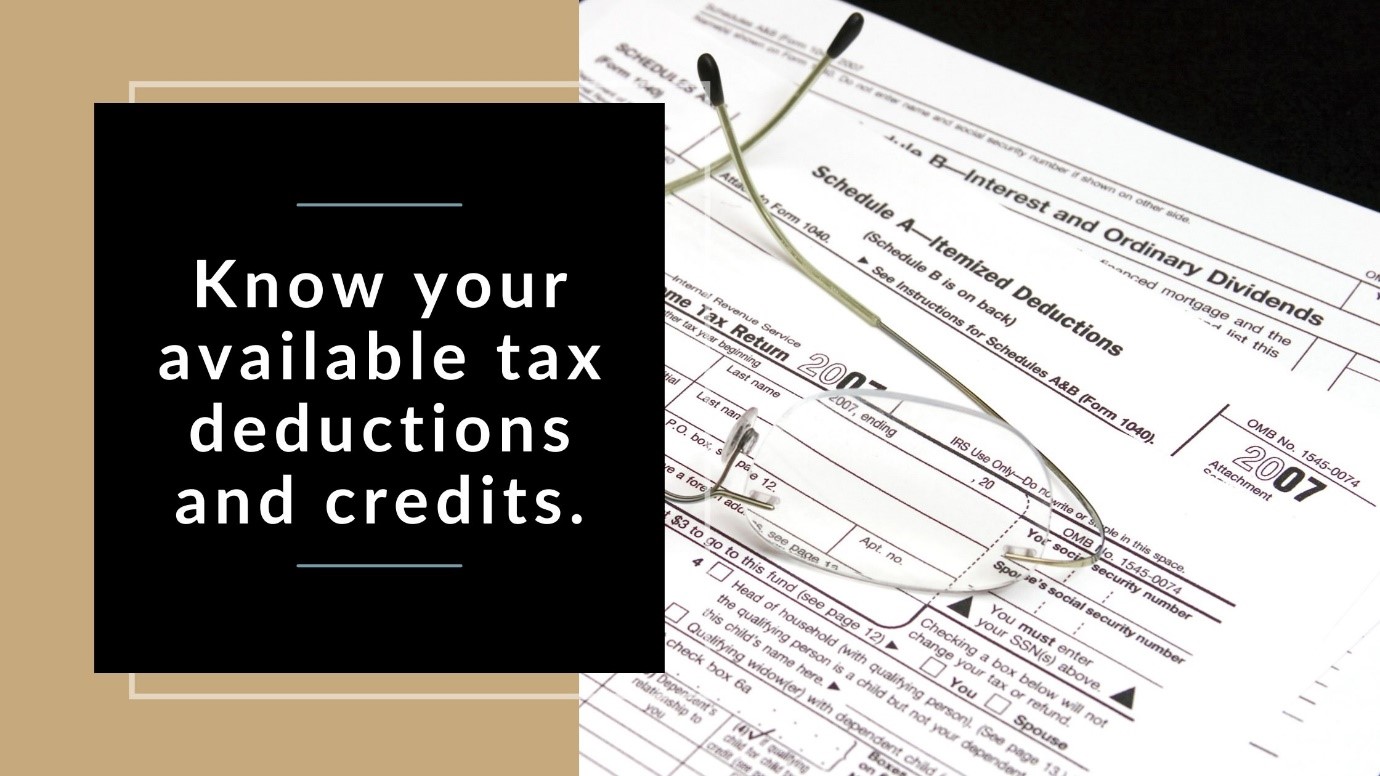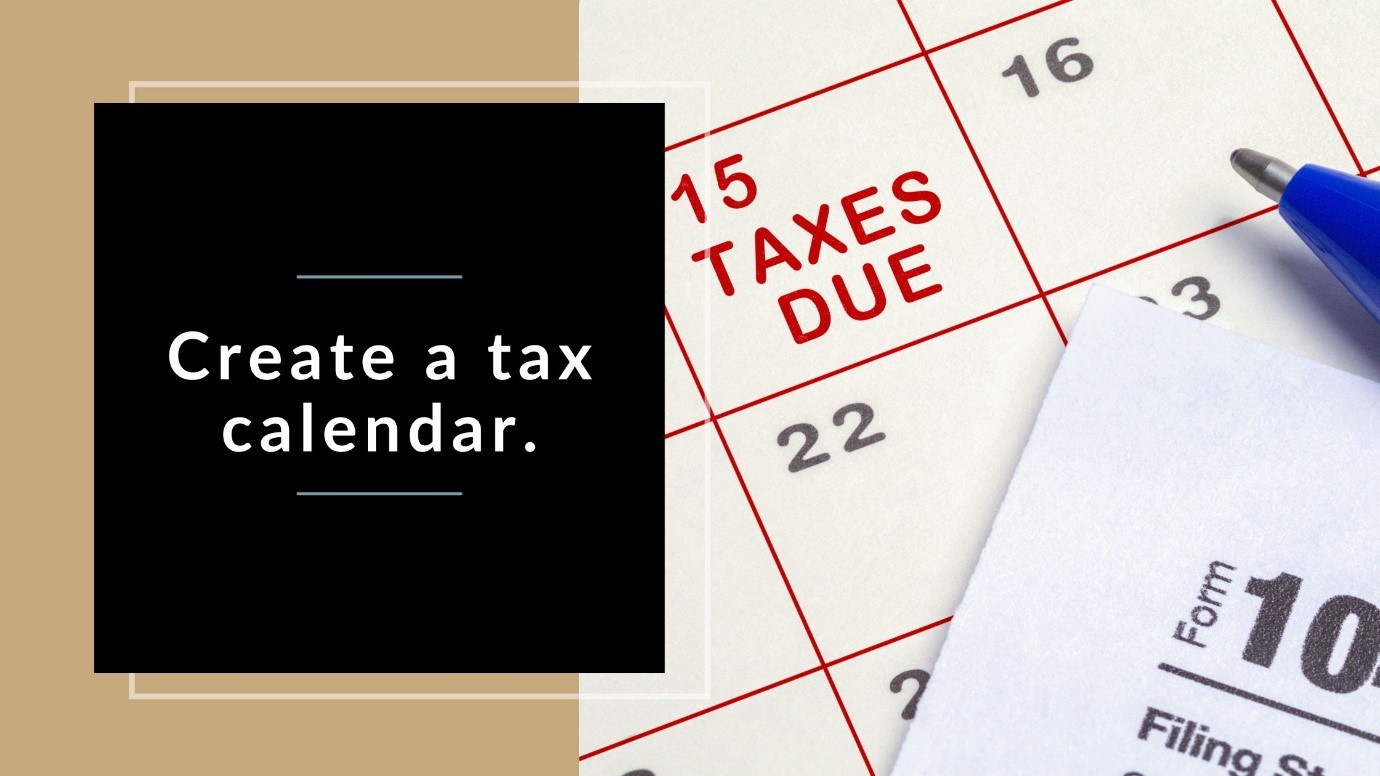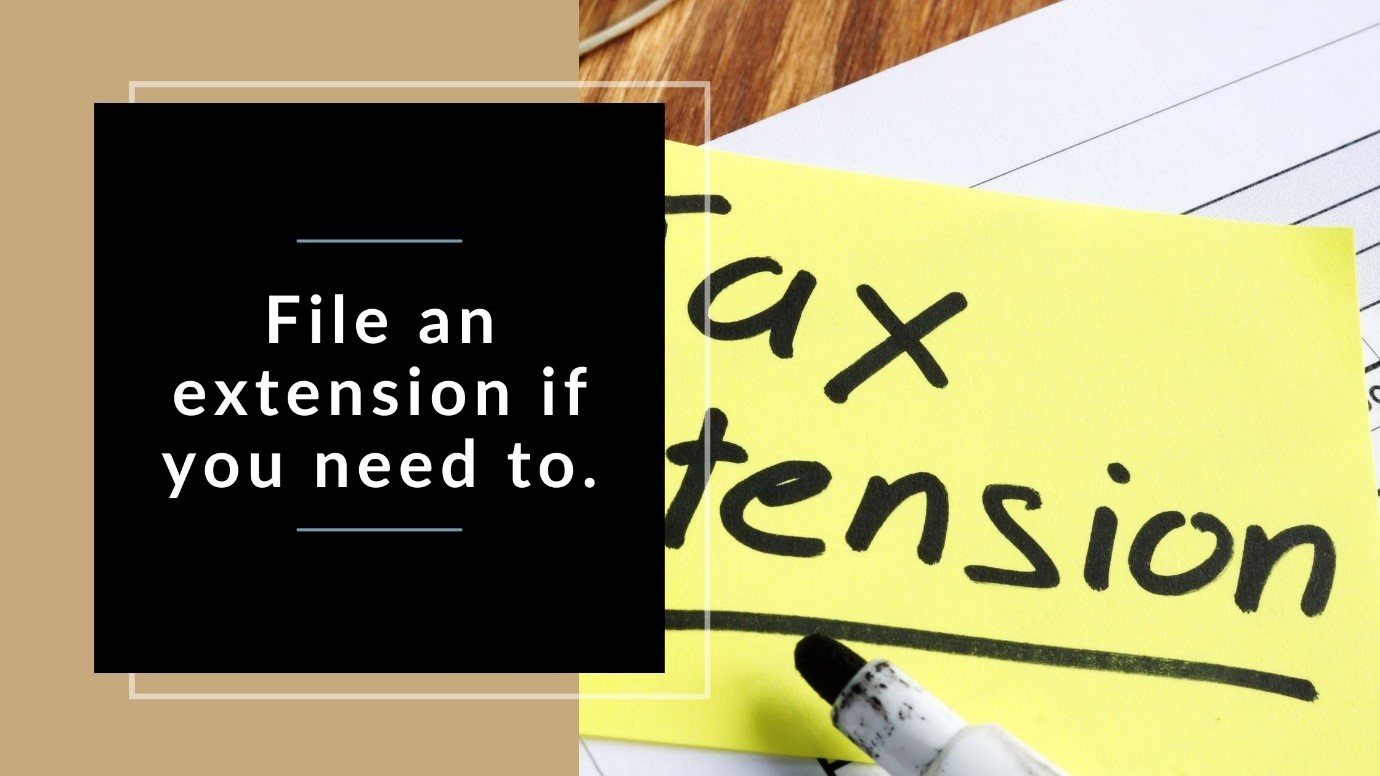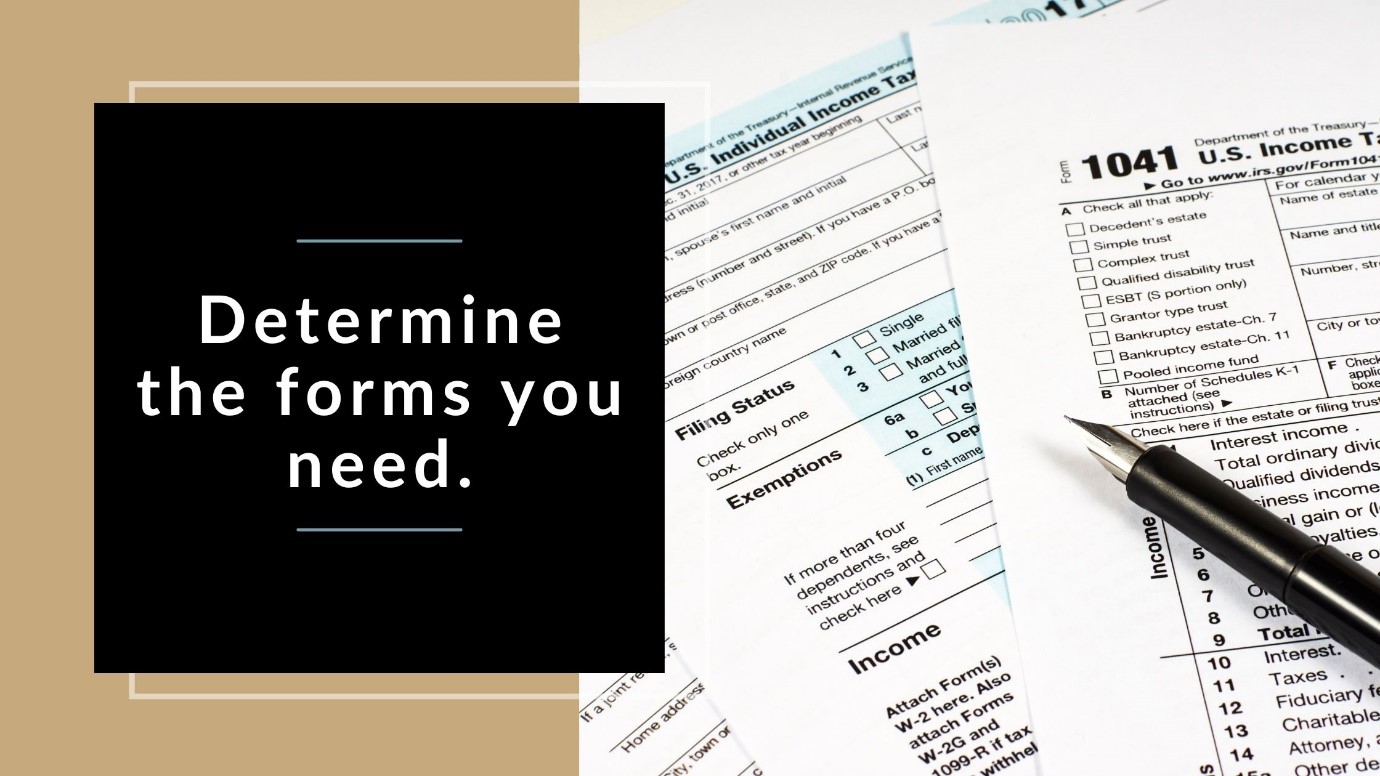‘Tis the Season: Tax Preparation Checklist for Small Businesses

Some may believe taxes should only be a concern during tax season (January to April). Still, tax preparation is a year-round process, and the complete groundwork must be established as early as October, even more so when you run a small business.
Preparing taxes as a small business owner can feel overwhelming, but it doesn’t have to be! Use the resources below as a checklist to help you prepare for the upcoming tax season.

Accurate and consistent recording of your cash flows is crucial in correctly filing your taxes.
QuickBooks Online makes it easy to track your expenses, manage cash flow, pay bills, create estimates and invoices, keep inventory, and manage your payroll (among many other things). Did you know we have certified QuickBooks Pro Advisors on staff to help you with your bookkeeping and troubleshooting needs? Contact us today to connect with one of our QuickBooks Pro Advisors.
Whether you decide to use QuickBooks Online or any other bookkeeping software, the key is to ensure you track throughout the year so pulling your reports is a breeze when tax time comes.

Once tax season has finally arrived, it’s time to gather and prepare documents for your business return.
Make sure you have the following organized and ready:
- Taxpayer Identification Number
- Personal Information
- Previous Year’s Tax Return
- Financial Business Reports
- Tax Forms
- Asset Information
- Loan Information
- Income Records
- Expense Records
- Payroll Data
- Inventory Total
- Stocks & Bonds Information
You should also use this time to review your previous tax returns to check if you’ve missed any tax credits and deductions so you can file an amended return for yourself using IRS Form 1120-X.

Tax deductions and credits save your business money, so it’s crucial to take advantage of the ones you qualify for. Your options will differ depending on which business tax return you must prepare.
While it varies for each business, here are a few to research or discuss with your tax preparer:
Tax Deductions:
Self-Rental
Many small business owners do not pay themselves rent to use the space for business purposes. However, this creates a problem because you won’t be able to deduct the building’s operating expenses to the extent of the rent from your business’ income because the building has generated a passive loss. Thus, you cannot deduct this from your business’s gross income, which leaves you with a higher tax liability.
The best practice is to have your business pay monthly rent for the office space, as this is a deductible business expense. The Internal Revenue Service requires that self-rentals be charged at a “fair market value” rental rate.
Advertising
Expenses such as printing business cards, social media ads, print or digital advertisements, etc., are deductible.
Home Office Deduction
To qualify, you must use the home office area regularly and exclusively as your principal place of business, a place to meet or deal with clients or customers, or as a separate structure used in the business.
Qualified Business Income Deduction (QBI)
20% of qualified business income can be deducted from the owner’s personal tax return.
Startup & Organizational Costs
You can deduct up to $5,000 in startup costs and $5,000 in organizational expenses (such as incorporating) incurred in the first year of business (but only if costs did not exceed $50,000 in total). The remaining costs (up to $40,000) are amortized over 15 years.
Membership Dues
Dues from professional and business-related organizations – chambers of commerce, civic organizations, or trade associations – can be claimed as deductions.
Franchise and Trademarks
If you buy a franchise, trademark, or trade name, the amount you paid or incurred as a business expense, with certain stipulations, is deductible.
Cancellation Fees
If you booked a business trip and had to cancel and reschedule, the airline rescheduling fee, as well as the hotel deposit you lost, are deductible.
Credit Card Convenience Fees
A small business that uses credit cards can deduct convenience fees charged by the card companies.
Education Expenses
Ordinary and necessary expenses paid for the education and training of the owner(s) and employees are deductible.
Business Mileage
You can take the standard mileage deduction for business trips using your personal vehicle. Just be sure to keep a log of the trip’s date, beginning and ending odometer, and business purpose.
Business Use of Cell Phone
You will need to calculate how much you use your cell phone for business purposes, such as making business calls, checking business email, texting clients/customers, and posting to the business’s social media accounts.
Parking Fees and Tolls
When traveling for business purposes, these are deductible.
Health Insurance Premiums
You can deduct healthcare premiums, paid out-of-pocket without tax breaks or subsidies, on your individual/family health plan (cannot be a group plan).
Petty Cash Expenses
Keep all receipts for business expenses you pay cash for.
Tax Credits:
Research and Development Tax Credit –
- The R&D tax credit supports activities related to developing, designing, and improving products, processes, or software. It provides qualified businesses with cash savings that they can use to further their research and development activities.
With the passage of the Inflation Reduction Act, the claimable credit doubled from $250,000 to $500,000.
Clean Energy Tax Credit –
- This tax credit incentivizes businesses’ efforts in going green and contributing to the reduction of carbon footprint:
- 30% of the amount spent on switching to low-cost solar power;
- 30% of purchase costs for clean commercial vehicles; and
- $5 per square foot of the building where energy efficiency improvements have been made.
Alternative Fuel Credit –
- If you’re using or selling alternative fuel for use in motor vehicles, motorboats, or aviation, then you can claim this credit against your excise tax liability at the rate of:
- You can avail of this credit if you’re using or selling alternative fuel in motor vehicles, motorboats, or aviation. Claim it against your excise tax liability at the rate of:
- $0.50 per gallon of liquid alternative fuels, and
- The Alternative Fuel Credit was initially set to expire on December 31, 2021. However, the Inflation Reduction Act has extended it until December 31, 2024.
- $0.50 per gasoline gallon equivalent of non-liquid fuels.
- You can avail of this credit if you’re using or selling alternative fuel in motor vehicles, motorboats, or aviation. Claim it against your excise tax liability at the rate of:
Work Opportunity Tax Credit –
- This tax credit is available to all employers who hire individuals who are members of targeted groups who, due to physical or mental disabilities, have a hard time finding employment.
The credit is computed at up to 40% of the first $6,000 in wages employees earn in their first year of work, capped at $2,400 per employee. To be included in the computation, the employees must have been employed for over 120 hours but less than 400. Other requirements vary per targeted group, so be sure to check them out.
Employee Retention Credit –
- The ERC is a refundable tax credit on qualified wages. It is available to businesses that experienced government shutdowns or reduced gross receipts. Eligible businesses that paid qualified wages from March 13, 2020, to September 30, 2021 (December 31, 2021, for Recovery Startup Businesses) can claim it.
The program has already been terminated with the passage of the Infrastructure Investment and Jobs Act. However, you can still retroactively file your claims within three years of the program’s termination.
Keep good records by properly categorizing and filing the receipts for all your expenses. Moreover, familiarize yourself with tax laws related to small businesses so you don’t miss any tax deductions and credits.
If you’re looking for accessible and customizable information and timely notifications, download the MBE CPAs App on:
Create a tax calendar.

Ensuring you are meeting the tax filing dates is essential. Dates differ depending on your business model or structure, so it’s important to stay on top of when you should be doing what.
For example, partnerships, S Corps, and multi-member LLCs will file on March 15, while single-member LLCs, C Corps, and sole proprietors will file on April 15. This is not the only due date that varies, so a great way to stay prepared is to create a digital calendar containing any important tax deadlines, appointments, or quarterly payment dates.
Creating a digital tax preparation calendar not only helps you with preparation but also prevents losing track of time and accruing penalties due to not submitting taxes on time – everyone wants to avoid late fines and interest.
File an extension if you need to.

If you experience setbacks in your business and find yourself scrambling to prepare on time, you may file for a six-month extension. Remember, such an extension must be filed before the March/April 15 due date (depending on the return you’re filing).
When filing your extension, note the reason for your request. Use the guide below to determine which form you need to fill out.
- S Corps, corporations, multi-member LLCs, and partnerships: 7004 Extension Form
- Sole proprietor, single-member LLC: 4868 Extension Form
Determine the forms you need.

Now that you’ve organized your books and records and gathered your documentation, it’s time to determine which business tax return you must prepare. You can use this as a guide when it’s time to file:
- S Corps file an 1120-S
- Corporations file an 1120
- Partnerships & Multi-Member LLCs file 1065 & Schedule K-1
- Sole Proprietors & Single-Member LLCs file Schedule C
Meet with an accountant.

Most small business owners are hesitant to ask for help. Still, preparing the taxes yourself is impractical and not as cost-efficient as you think. Due to tax laws ‘ complexities, we often find business owners pay more taxes when filing on their own. Relying on an accountant to plan and prepare your taxes will help:
- Avoid any legal issues,
- Outline financial strategies, and
- Generate reports that help you make good business decisions for the future.
Why Small Businesses Need an Accountant Year-round
Small business owners often discuss their need to meet with an accountant around tax time. However, you would benefit more from engaging in their services year-round. They will help you analyze financial data and reports and help guide critical decisions within the company to increase profit.
At MBE CPAs, we take pride in our work and would love to assist. Talk to us today to learn more about the services we offer.


